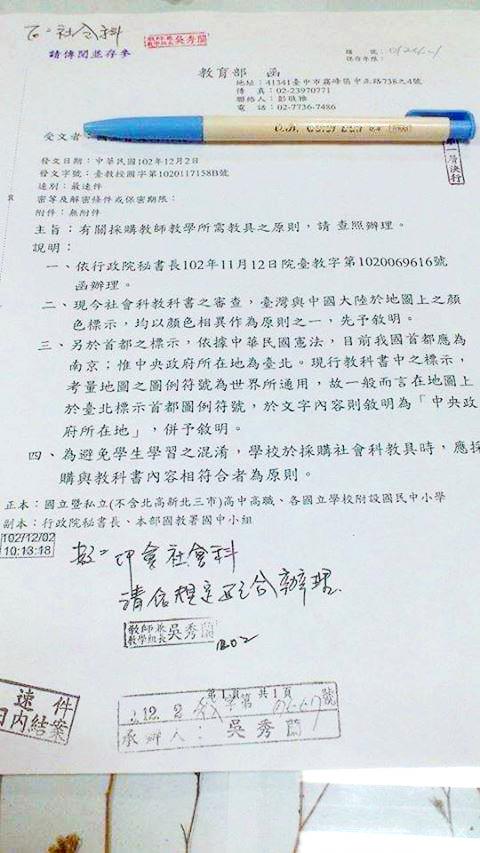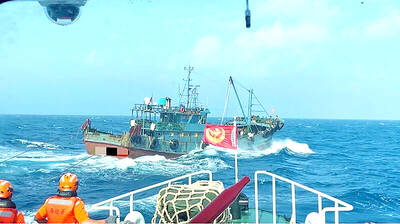A government document ordering schools’ procurement of teaching materials that mark Nanjing as the capital of the Republic of China (ROC) and Taipei as the current location of the central government indicated President Ma Ying-jeou’s (馬英九) administration’s persistent attempts to promote the links between Taiwan and China, as well as the administration’s misinterpretation of the Constitution, lawmakers and academics said yesterday.
A photograph posted by National Taipei University of Education professor Lee Hsiao-feng (李筱峰) on Facebook yesterday, which showed a Ministry of Education document issued on Monday to schools nationwide, went viral on the Internet.
“The document reflects the Ma administration’s ideology and its state of mind as a government-in-exile, which the majority of Taiwanese do not agree with. We should not be surprised because Ma has always tried to go against the trend,” Lee said.

Photo downloaded from Lee Hsiao-feng’s Facebook page
The professor said the photo was taken by one of his students, who is a teacher.
“Although Taiwan and mainland China have been marked with different colors in the textbook, Nanjing should be the ROC capital and Taipei is the current location of the central government, according to the ROC Constitution,” the document said.
Due to universal standards in map legends, Taipei would still be marked as the capital on the maps in teaching materials, but teachers are obligated to clearly explain the complexity of the situation to their students, the ministry said in the document, which was sent to high schools, vocational schools, junior-high schools and elementary schools across the country, except for those in Taipei, Greater Kaohsiung and New Taipei City (新北市).
Lee said that Ma has been trying to sinicize teaching materials, for example by insisting on referring to the period during which Taiwan was a Japanese colony as the “Japanese occupation period” in high-school textbooks.
Democratic Progressive Party (DPP) Legislator Lee Chun-yi (李俊俋) said the Constitution does not designate any city as the capital.
“Ma has been using the Constitution as a political tool to link Taiwan with China and to endorse his initiative of ‘one country, two regions.’ Everyone knows it’s nonsense and his interpretation of cross-strait relations is far from reality,” Lee Chun-yi said.
Under Ma’s leadership, government officials’ interpretation of the nation’s status has been “absurd,” he added, citing the example of Mongolian and Tibetan Commission Minister Tsai Yu-ling (蔡玉玲), who recently said that Mongolia remains ROC territory.
Ma has been inconsistent, DPP Legislator Chen Chi-mai (陳其邁) said, as he said he wanted to “make Taipei a world-class capital city” when he served as Taipei mayor.
The DPP administration between 2000 and 2008 reiterated that Taipei is the ROC capital, Chen said.
“Judging by a series of policy changes during the Ma administration, it has been engaging in a ‘de-Taiwanization campaign’ in an attempt to brainwash students and to force Ma’s ‘one China’ ideology upon young people,” Chen said.
Later yesterday, the ministry official in charge of the matter said he would take full administrative responsibility for not making the ministry’s intent clear in the document.
The head of the ministry’s K-12 Education Administration Division, Chiu Chien-kuo (邱乾國), said that during the Period of Political Tutelage (訓政時期), it had been mentioned that the capital of the nation was Nanjing, but there was no such mention in the Constitution after its ratification.
Since the implementation of the Act Governing Principles for Editing Geographical Educational Texts (地理教科書編審原則) in 1997, the guiding principle for all maps in geographical textbooks was that Taipei was to be marked as the capital with a label stating: “Location of Central Government,” Chiu said.
The part in the ministry’s document mentioning Nanjing did not provide a detailed explanation, for which he extended his apology, saying he was willing to assume responsibility for any administrative lapse, he added.
Additional reporting by staff writer

POLITICAL AGENDA: Beijing’s cross-strait Mid-Autumn Festival events are part of a ‘cultural united front’ aimed at promoting unification with Taiwan, academics said Local authorities in China have been inviting Taiwanese to participate in cross-strait Mid-Autumn Festival celebrations centered around ideals of “family and nation,” a move Taiwanese academics said politicizes the holiday to promote the idea of “one family” across the Taiwan Strait. Sources said that China’s Fujian Provincial Government is organizing about 20 cross-strait-themed events in cities including Quanzhou, Nanping, Sanming and Zhangzhou. In Zhangzhou, a festival scheduled for Wednesday is to showcase Minnan-language songs and budaixi (布袋戲) glove puppetry to highlight cultural similarities between Taiwan and the region. Elsewhere, Jiangsu Province is hosting more than 10 similar celebrations in Taizhou, Changzhou, Suzhou,

COGNITIVE WARFARE: Chinese fishing boats transmitting fake identification signals are meant to test Taiwan’s responses to different kinds of perceived incursions, a report said Chinese vessels are transmitting fake signals in Taiwan’s waters as a form of cognitive warfare, testing Taipei’s responses to various types of incursions, a report by the Institute for the Study of War said on Friday. Several Chinese fishing vessels transmitted fake automatic identification system (AIS) signals in Taiwan’s waters last month, with one mimicking a Russian warship and another impersonating a Chinese law enforcement vessel, the report said. Citing data from Starboard Maritime Intelligence, the report said that throughout August and last month, the Chinese fishing boat Minshiyu 06718 (閩獅漁06718) sailed through the Taiwan Strait while intermittently transmitting its own AIS

The Republic of China (ROC) is celebrating its 114th Double Ten National Day today, featuring military parades and a variety of performances and speeches in front of the Presidential Office in Taipei. The Taiwan Taiko Association opened the celebrations with a 100-drummer performance, including young percussionists. As per tradition, an air force Mirage 2000 fighter jet flew over the Presidential Office as a part of the performance. The Honor Guards of the ROC and its marching band also heralded in a military parade. Students from Taichung's Shin Min High School then followed with a colorful performance using floral imagery to represent Taiwan's alternate name

CHINESE INFILTRATION: Medical logistics is a lifeline during wartime and the reported CCP links of a major logistics company present a national security threat, an expert said The government would bolster its security check system to prevent China from infiltrating the nation’s medical cold chain, a national security official said yesterday. The official, who wished to stay anonymous, made the remarks after the Chinese-language magazine Mirror Media (鏡周刊) reported that Pharma Logistics (嘉里醫藥物流) is in charge of the medical logistics of about half of the nation’s major hospitals, including National Taiwan University Hospital and Taipei Veterans General Hospital. The company’s parent, Kerry TJ Logistics Co (嘉里大榮物流), is associated with the National Committee of the Chinese People’s Political Consultative Conference (CPPCC) and the Chinese People’s Liberation Army (PLA), the